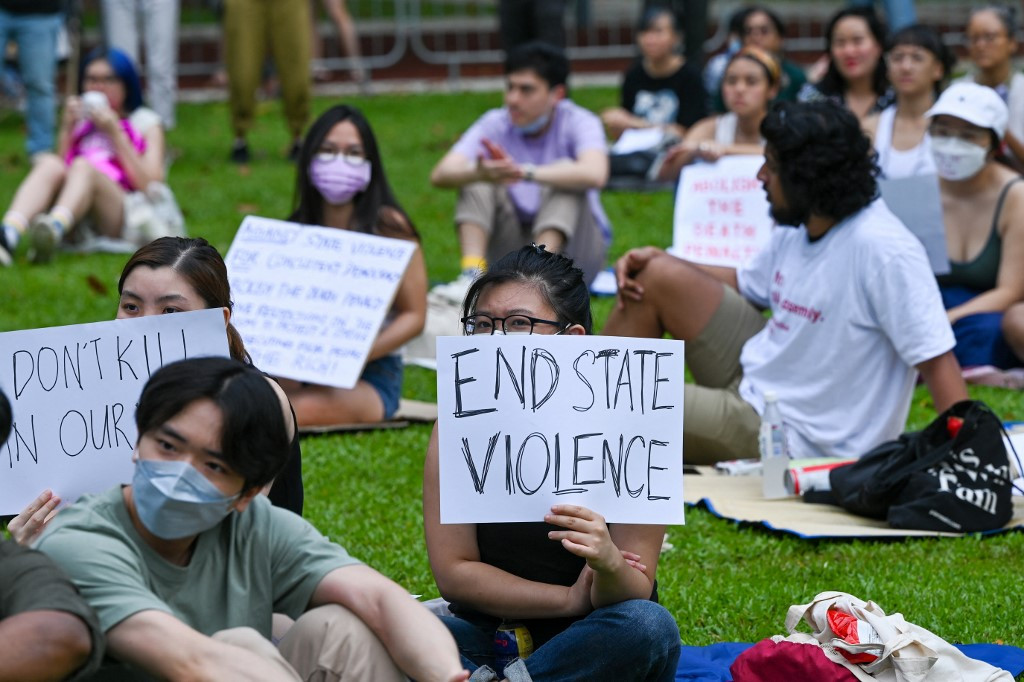Death penalty for drugs: Will 2022 signal sea change in ASEAN?
Southeast Asian countries lead the world in their combined number of dealth penalties handed down for drug offences, while the ASEAN human rights body continues to maintain its silence on the issue.
Change Size

O
n March 30, Singapore executed Abdul Kahar bin Othman, a local man sentenced to death for drug offenses and the first person to be executed in Singapore in since 2019. Othman had been unable to appeal his execution because he did not have a lawyer.
Eight of the 35 countries that still retain the death penalty for drug offenses are in Southeast Asia and were responsible for a staggering 91.5 percent of all confirmed death sentences given for drug offenses worldwide, according to the Global Review 2021 from Harm Reduction International (HRI).
The imposition of these death sentences is shrouded in secrecy and characterized by widespread human rights violations (HRI 2019), such as lack of access to legal representation (HRI 2020), as in Othman’s case. Too often, there are reports of torture, ill treatment and coerced confession.
The situation is particularly dire for foreign nationals who find themselves sentenced to death outside of their home countries, often without interpreters and lawyers made available to them during the legal process, says a March 2019 HRI briefing paper.
In Indonesia, all 14 convicted drug offenders who were executed in 2015 and 2016 were foreign nationals.
Obviously, 2021 was not the first year in which death sentences in Southeast Asian countries comprised the overwhelming majority of death sentences for drug offences around the world. The HRI’s Global Overview 2020 shows that 98 percent of confirmed global death sentences for drugs, or 209 out of 213 sentences, were delivered in Southeast Asian countries: 79 in Vietnam, 77 in Indonesia, 25 in Malaysia, 13 in Laos, eight in Thailand and six in Singapore. The figure presented in the 2019 HRI briefing paper is similar, with 170 out of 180 confirmed death sentences, or 94.4 percent.
The percentage of drug convicts on death row is alarming: 98 percent in Laos, 66 percent in Indonesia, 67.8 percent in Malaysia, 55 percent in Singapore, 63.5 percent in Thailand and 50 percent in Brunei Darussalam. By 2021, a total of 1,633 people were on death row for drug offenses in the region, although the figure in Vietnam remains unknown.
The above figures likely paint only a partial picture because of a lack of transparency, but they demonstrate how the drug policies of Southeast Asian countries have a significant, negative impact on human rights in the region as well as efforts to abolish the death penalty around the world.
Capital punishment is an abhorrent, outdated and inhumane form of punishment. Applying it for drug offenses is a violation of international human rights law, a position that has been reaffirmed by numerous international authorities and human rights bodies.
Closer to home, however, ASEAN human rights bodies, including the ASEAN Inter-governmental Commission for Human Rights (AICHR), remain silent on the issue.
Nothing was heard from the AICHR in response to Othman’s case, either before or after his sentence was carried out. The regional commission also failed, and continues to fail, to respond to Singapore’s announcement on the execution of Nagaenthran K. Dharmalingam, whose case has sparked an international outcry from rights groups.
Five UN human rights experts published a statement in November 2021 urging Singapore to halt his execution, accompanied by dozens of statements and joint statements from civil society organizations. In February 2022, Singaporean authorities issued notices of execution for three more people on death row for drug offenses.
Again, nothing was heard from the AICHR.
More executions are set to follow that of Othman. Earlier this week, Singapore’s Court of Appeal dismissed Dharmalinggam’s appeal. This means that Singapore does not necessarily need to issue a new notice of execution, and rights activists fear that Dharmalinggam may be executed soon.
As a regional human rights mechanism, the AICHR has the responsibility and the legitimacy to denounce and seek to address human rights violations that occur in the region. The death penalty is a human rights issue in Southeast Asia, but the region’s main human rights body is yet to oppose it publicly.
Moving forward, there are plenty of opportunities for the AICHR to raise and advocate for abolishing the death penalty for drug offenses. It is not too late for the AICHR to ask the Singaporean government to stop its planned executions and undertake much-needed reform of the country’s draconian drug policies.
It is also not too late to support the Philippines’ Commission on Human Rights in blocking President Rodrigo Duterte’s plan to reinstate the death penalty. And certainly, there are plenty of opportunities to support Malaysia’s effort to abolish the death penalty for drug offenses as the country plans to table an amendment to that policy in late 2022.
So, will 2022 be the year that Southeast Asia can finally have a regional human rights mechanism that champions abolishing the death penalty for drug offenses?
***
The writer is human rights lead at Harm Reduction International.









